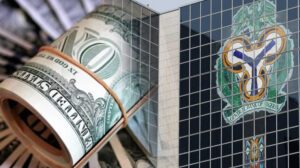
95% bank debtors borrowed from MFBs in 2024 — CBN
95% bank debtors borrowed from MFBs in 2024 — CBN
The Central Bank of Nigeria (CBN) has revealed that 95.66 percent of bank debtors borrowed from microfinance banks (MFBs) as of September 2024, underscoring the crucial role of MFBs in the country’s lending landscape, particularly for individuals and small businesses.
Of the 6,537 total debtors recorded across all creditor types, 6,253 were linked to MFBs, reflecting their central role in providing access to credit. The data shows a slight month-on-month decline in MFB debtors, from 6,573 in August 2024 to 6,253 in September 2024. This drop is even more pronounced year-on-year, with a 26.4 percent reduction from 8,500 in September 2023.
The decline in the number of debtors is largely attributed to rising interest rates, which have made credit more expensive and discouraged borrowing. This trend coincides with a series of interest rate hikes implemented by the CBN under Governor Olayemi Cardoso. Since assuming office, Cardoso has overseen six consecutive increases in the Monetary Policy Rate, raising it from 18.75 percent in February 2024 to 27.50 percent by November 2024. These measures aim to combat rising inflation, which reached 34.80 percent in December 2024.
The higher interest rates have led to increased borrowing costs, which in turn have potentially deterred individuals and businesses from seeking loans. This is reflected in the overall decline in debtor numbers across various financial institutions.
The rise of digital loan applications has also played a significant role in changing borrowing patterns. These platforms offer quick, collateral-free loans, which have become increasingly attractive to borrowers despite concerns over high interest rates and aggressive recovery practices. The growing popularity of these platforms may be contributing to the reduced patronage of traditional financial institutions, including MFBs.
The total number of debtors across all creditor types stood at 6,537 in September 2024, a decrease from 6,916 in August 2024 and 9,071 in September 2023. This represents a 28 percent year-on-year (YoY) drop, reflecting the impact of higher borrowing costs and a tightening credit market.
Microfinance banks remain the dominant creditors, accounting for approximately 96 percent of all debtors in September 2024. In contrast, deposit money banks saw their debtor numbers fall sharply, from 498 in September 2023 to just 155 in September 2024. This marks a 68.9 percent YoY decline, with a 33.5 percent month-on-month (MoM) reduction from 233 in August 2024. The steep drop suggests that traditional banks, already constrained by stricter credit requirements, have seen further reductions in lending due to rising interest rates and competition from alternative lenders.
Other creditor types showed mixed results. Finance houses experienced significant growth, with debtor numbers rising from 20 in September 2023 to 59 in September 2024, a 195 percent YoY increase. MoM, finance houses recorded a sharp rise of 110 percent, as debtors grew from 28 in August 2024.
Non-bank financial institutions saw a more modest YoY increase of 32 percent, rising from 53 in September 2023 to 70 in September 2024, although the figure declined MoM by 14.6 percent.
The data also revealed that individuals remain the largest group of borrowers, accounting for 5,692 of the total 6,537 debtors in September 2024. This figure reflects a slight decline from 5,964 in August 2024 and a substantial drop from 8,227 in September 2023. The YoY reduction of 30.8 percent highlights the financial strain many Nigerians face due to higher borrowing costs, as well as the growing appeal of alternative lending platforms like loan apps.
Other debtor categories showed varying trends. Large businesses saw a significant reduction in borrowing activity, with debtor numbers falling from 86 in September 2023 to 51 in September 2024, a 40.7 percent YoY decline. MoM, their numbers also dropped by 13.6 percent, from 59 in August 2024. Medium businesses showed relative stability, with a slight increase in debtors from 473 in August 2024 to 478 in September 2024, representing a 1 percent rise. YoY, medium business debtors grew by 7.7 percent, from 444 in September 2023.
Small businesses recorded a modest YoY increase, with debtor numbers rising from 264 in September 2023 to 282 in September 2024, a 6.8 percent growth. However, this category experienced a sharp MoM decline of 25.4 percent, as debtor numbers fell from 378 in August 2024.
Micro businesses, on the other hand, saw declines across the board. Their debtor count dropped by 32 percent YoY, from 50 in September 2023 to 34 in September 2024, and by 19 percent MoM, from 42 in August 2024.
In terms of secured transactions, the total value of loans across all debtor types stood at N118.73 billion in September 2024, reflecting a 4.2 percent YoY increase from N113.89 billion in September 2023. However, this figure represented a 12.8 percent MoM decline from N136.21 billion in August 2024. Individual borrowers accounted for N22.2 billion of this total, showing a sharp decline from N39.61 billion in August 2024 but a significant YoY increase from N14.08 billion in September 2023. The 57.5 percent YoY growth in secured loan values for individuals highlights their continued reliance on credit despite higher interest rates.
Small businesses also showed growth in secured loan values, rising 68 percent YoY from N3.08 billion in September 2023 to N5.18 billion in September 2024. However, micro-businesses experienced declines, with loan values dropping 33.7 percent YoY from N494.93 million in September 2023 to N328.22 million in September 2024.
Medium businesses, which had previously shown stable borrowing patterns, recorded a drastic MoM decline in loan values, from N68.88 billion in August 2024 to N11.26 billion in September 2024.
The dominance of microfinance banks continues against the backdrop of rising competition from digital loan apps, which have become increasingly popular due to their accessibility. These apps offer quick, collateral-free loans but have been criticised for predatory practices, including high interest rates, data privacy violations, and aggressive debt recovery tactics such as public shaming. However, the rising cost of borrowing from regulated institutions, driven by elevated interest rates, has pushed some Nigerians towards these alternative lenders despite the risks.




